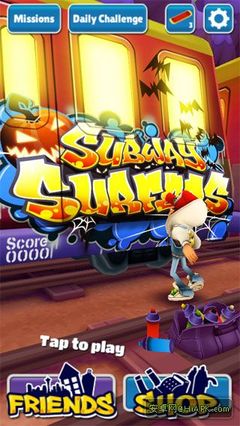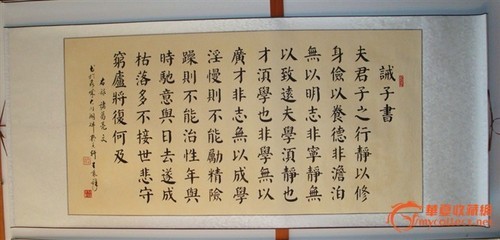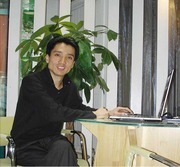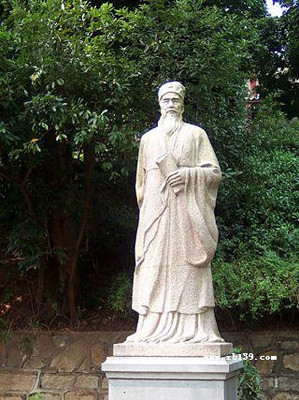
《师说》解
廖沫沙
一鸣按:2003年正月在洛阳书市看到《当代中国散文精品大观》一书(上下册),甚是喜欢,后来当了大学教师,看到书中廖沫沙先生“《师说》解”一文后感悟颇多。于2009年放到博客中供大家赏析。近日又读了此文和张培基先生的英译文,此次一并把中英文以对照的形式贴出来与大家一起欣赏,学习。
注:此文部分已经被上海外国语大学和浙江大学作为研究生入学考试翻译试题考过,希望对考研的同学们有所帮助。
原文来源:
《师说》解原文摘自《当代中国散文精品大观》(69-71页),吴泽永编选,太白文艺出版社,1995年1月。
译文来源:
《师说》解英语译文:选自《英译中国现代散文选》第二辑(297-300页),张培基译,上海外语教育出版社,2003年9月。
《师说》解
廖沫沙
年过五十的老先生,大概总是读过韩愈的《师说》。这篇文章里很有几句话值得今天当老师和学生的想一想。例如他说:
“孔子曰:三人行,则必有我师。是故弟子不必不如师,师不必贤于弟子。闻道有先后,术业有专攻,如是而已。”
韩愈的原意:是因为自己接受了门徒,为了抵制当时舆论的非议,所以写这篇文章自解。他的意思是说,自己虽是作了先生,并不一定样样贤于弟子,从他学的人也不一定不如他,人们不必因此而大惊小怪。本来,只要是一个人闻道在先,不管他是什么人,都可以拜为老师。要学习的是知识,用不着问他“生乎我前”或“生乎吾后”;也用不着要求老师精通百般武艺,只要他有一门是比自己好的,就应该任他为老师,向他学习。这是讲给求学的人听的。但也可以反过来讲给“传到授业解惑”的老师们听。
“弟子不必不如师,是不必贤于弟子”,这是一个真理,并不是瞎说。老师和学生并没有什么不可逾越的界限。在这门知识上老师高于学生,在另一门知识上,学生也可能高于老师;今天老师高于学生,明天学生可能高过老师。这也是辩证法,对里面的统一。老师和学生可以互相转换,学生要向老师学习,老师也要向学生学习之处。
《礼记》的《学记》有一段著名的话,意识也和这相近:“虽有佳肴,弗食,不知其肴也;虽有至道,弗学,不知其善也。是故学然后知不足,教然后知困。知不足,然后能自反也。知困,然后能自强也。故曰:教学相长也。‘说命’曰:‘斅学半’。其此之谓乎!”礼记的话随着重在自反自强,不如韩愈说的更彻底。但是它所说的“教然后知困”,“教学相长”,所引的“斅学半”(就是说教学各居其半,相反而相成),就是在今天说来,也还是颠颇不破的。
做先生的必然同时做学生,或者首先做学生,像马克思所说的“教育者必先受教育”,这个道理说来很浅显,但是人们在实际生活中却很不容易承认,特别是当老师当久了的人,或者像韩愈所说的“术业有专攻”的人,就很不容易接受这个辩证法。
老师们不容易接受这个道理,倒也事出有因。“弟子不必不如师,是不必贤于弟子”,虽是封建思想的代表者韩愈所提出来的一个观点,但是在封建时代却并不通行。正好相反,“天地君亲师”,在封建时代,老师是同“天地君亲”在一起,居高面临下,弟子哪里能同老师上下平等而又矛盾统一呢?老师毕竟是老师,师道尊严,神圣不可侵犯,弟子毕竟是弟子,怎可已超过老师?这个观点相沿成习。
新的师生关系,倒真像韩愈所说的,是“不耻相师”。就是互为老师,互为学生,彼此平等,不分尊卑,真正是“道之所存,师之所存”,谁有学问,谁就是老师。
从学生方面来讲,应该有“道之所存,师之所存”的尊重真理的精神;从老师方面来讲,也应该像孔夫子那样,有一点“三人行,则必有我师”的雅量。
韩愈援引孔子的先例,作出判断说,“圣人无常师”。这句话的意识,是说真正聪明有学问的人,没有一个一定的老师;见人有学问,不管是谁,就认他为师。我想还得给他添一句:“师亦无常道,”就是当老师的并不经常等于真理。一个当老师的人,既要用于坚持自己的真理,又要勇于承认自己的非真理。要保持师位的,不妨试一试这条方案,同学生们一道来为科学真理奋斗。
在另一方面,当学生的也应当了解;既然师和弟子并不以师必贤于弟子、弟子必不如师为条件,那末,今天的学生在看到老师的某一方面的短处以后,也就不应该马上得到结论说,老师,老师再不能做老师了。某一方面的短处并不等于一切方面的短处;反之,某一方面的长处也并不等于一切方面的长处。今天的学生担负着重大的使命,应该深切地认识自己知识的还很有限,必须虚心地向一切有所知、有所长的人学习,特别是向“术业有专攻”的老师们学习!这就是我的《师说》解。
英译文:
My interpretation of On theTeacher
Liao Mosha
Elderlypeople aged over fifty must have read Han Yu’s On the Teacher.Quite a few remarks in this essay are worthy of contemplation bypresent-day teachers and pupils. Take the following forexample:
“Confuciussays: ‘Out of three men, there must be one who can teach me.’ Sopupils are not necessarily inferior to their teachers, nor teachersbetter than their pupils. Some learn the truth earlier than others,and some have special skills — that is all.”
Han Yu wrotethis essay to defend himself against the attack of his time on hishaving accepted some disciples. In his opinion, having discipleswas not something to be surprised at because, as a teacher, he wasnot necessarily better than his disciples in every way, nor hisdisciples always inferior to him. As a matter of fact, one who haslearned the truth earlier than you, no matter who he is, should beacknowledged as a teacher. You need not ask whether he was bornbefore or after you because what matters is the knowledge that hecan impart to you. Nor should you presume him to be omniscient. Solong as he excels you in one respect, you should learn from him andcall him your teacher. This advice of mine is addressed to pupils,and teacher as well — teachers whose duty it is to “to pass on thetruth, impart knowledge and dispel ignorance”.
“Pupils arenot necessarily inferior to their teachers, nor teachers betterthan their pupils”— that is a truth, not a fallacy. There is noimpassable demarcation line between teacher and pupil. While ateacher may be superior to his pupil in one branch of knowledge,the latter may be superior to the former in another. While theteacher may be superior to his pupil today, the latter may besuperior to the former tomorrow. That demonstrates the law ofdialectics and the unity of opposites. A kind of interplay existsbetween teacher and pupil. The pupil should learn from his teacher,but sometimes there may also be something the teacher has to learnfrom his pupil.
A similar ideais expressed by the following well-known passage quoted from Xueji(The Subject of Education), a chapter of the ancient book Liji (TheBook of Rites): “However nice the food may be, if one does not eatit, he does not know its taste; however perfect the doctrine maybe, if one does not learn it, he does not know its value.Therefore, when he learns, one knows his own deficiencies; when heteaches, one knows where the difficulty lies. After he knows hisdeficiencies, one is able to examine himself. Hence, ‘teaching andlearning help each other’; as it is said in Yue Ming, ‘Teaching isthe half of learning’.” The above quotation from Liji, which laysemphasis on self-examination and self-improvement, is lessthoroughgoing than what Han Yu says about education. Nevertheless,its remarks such as “When he teaches one knows where the difficultylies”, “Teaching benefits teachers as well as pupils” and “Teachingis the half of learning” (a quotation meaning teaching and learningare opposite and complementary to each other) all remainirrefutable to this day.
To be ateacher, one must at the same time be a student, or be a studentfirst, just as Carl Marx says, “Educators must themselves beeducated first.” Though this is plain truth, yet people in theirpractical life seldom recognize it. It is especially hard forteachers of long standing or those with “special skills”, as Han Yusays, to look at this matter dialectically.
It is notwithout reason or cause that teachers fail to be readily receptiveto the above-mentioned concept. The viewpoint “Pupils are notnecessarily inferior to their teachers, nor teachers better thantheir pupils”, though put forward by Han Yu, himself afeudal-minded scholar typical of his time, was by no means popularin the feudal age. On the contrary, as teachers were ranked high upalong with “Heaven, Earth, Sovereign and Parents” as objects ofworship in the feudal age, pupils could never be on an equalfooting with their teachers to form a unity of opposites. Afterall, a teacher was a teacher. His teaching profession wasdignified, sacred and inviolable. A pupil was a pupil. He was neverexpected to surpass his teacher. The practice has come down fromthe past and become customary.
The newrelationship between teacher and pupil should be that of, in thewords of Han Yu, “not (being) ashamed to learn from each other”.That is to say, teacher and pupil should teach each other and learnfrom each other. They should teach each other as equals regardlessof seniority, so that, as Han Yu says, “whoever knows the truth canbe a teacher”.
Pupils shouldknow the spirit of respecting the truth, learning from whoeverknows. Teachers should be so open-minded as to be ready to learnfrom anyone who knows, just as Confucius says, “Out of three men,there must be one who can teach me”.
Han Yu, goingby Confucius’ teaching, asserts that “a sage has no definiteteacher”, meaning that a really wise and learned person has nofixed teacher and that he learns from whoever knows. I think I mayas well added, “No teacher is all-knowing,” meaning that no teacheris infallible. A teacher should have the courage not only to holdfirmly to the truth but also to admit his mistake. All devotedteachers might as well put this into practice so that they canstrive, together with their pupils, for scientific knowledge andthe truth.
On the otherhand, however, pupils should also understand this: when theydiscover a teacher’s weak point in a certain respect, they shouldnot jump to the conclusion that he is no longer qualified as ateacher, because the weak point in one respect does not mean theweak point in all respects and, likewise, the strong point in acertain point does not mean the strong point in all respects.Students of today, shouldering a great historical task, shoulddeeply understand how limited their knowledge is and how importantit is for them to learn modestly from all those who have knowledgeand strong points, especially teachers who “have special skills”!That is all I can say about On the Teacher.
 爱华网
爱华网


